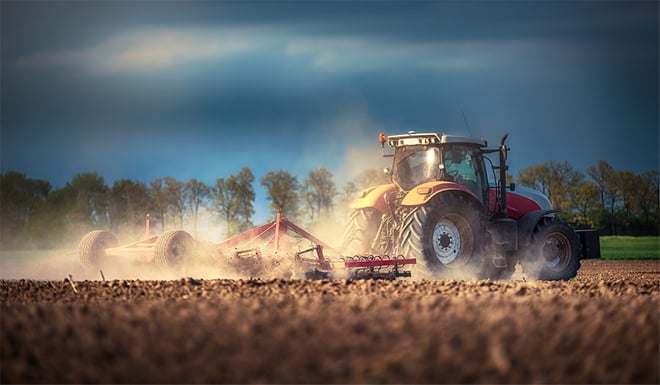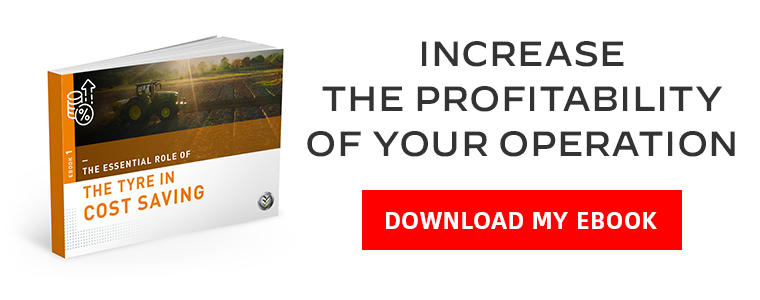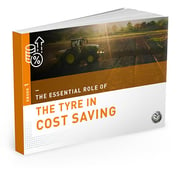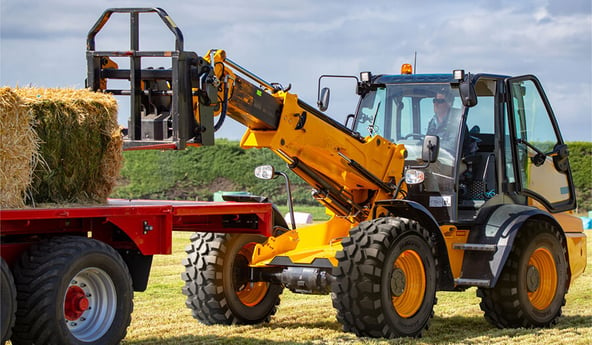There is a simple reason why manufacturers produce different tyre models. It’s not for the pleasure of creating a tyre size catalogue, but actually because there are very different kinds of strain imposed on your tyres depending on what you use them for. You know that to do a good job you need to be well equipped, and for your tyres this principle is very pertinent because, if you go beyond appearances, all tyres are very different at the level of their design and each category has been developed to obtain optimal efficiency and productivity in carrying out a specific task or for a precise use.
In this article we look at the type of tyre that is best adapted to each type of use. Depending on the main use of your tractor, you can improve yields by choosing the type of tyre that truly corresponds to your principal activity.
1. What are the most suitable tyres for field crops
To improve productivity in field crop farming the tendency is to move towards increasingly powerful machines which are heavier overall and for which the main disadvantage is the resulting soil compaction.
The tyre has a major role to play in preserving your productivity. With larger tyres and a greater volume of air you can effectively increase your traction capacity, save time on your campaigns with bigger, heavier implements, reduce fuel consumption while preserving your soil from excessive compaction.
The latest generation low-pressure VF tyres allow you to carry 40% more load than normal tyres at a lower inflation pressure. Their very supple but extremely resistant sidewalls give them a larger soil footprint for a better load distribution. Furthermore, you will save time by keeping the same pressure in the fields and on the road, thus losing less time adapting inflation pressure between operations.
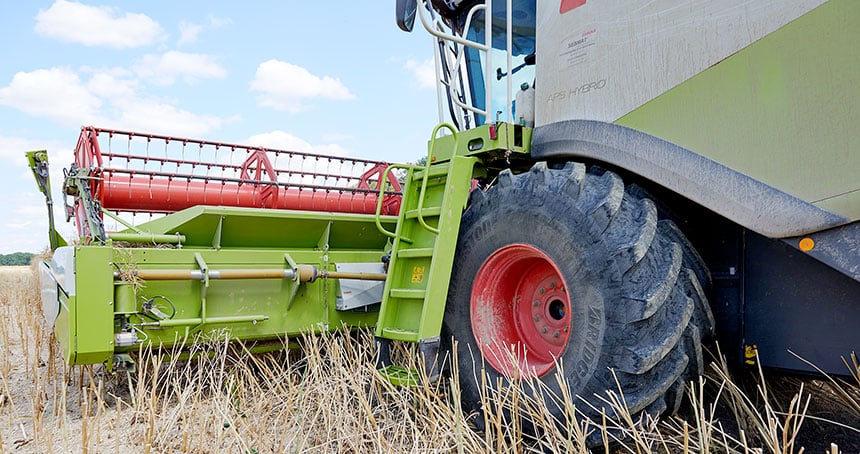
The harvest: an important moment for field crops
For field crops, harvesting is a major operation during which tyres are crucial. Indeed, if you have taken care to preserve your soil all year, it would be such a pity to harvest with standard tyres which will need an inflation pressure of 4 bar to bear the 37,600 kilos of the combine harvester, including 28,000 kilos for the loaded front axle.
The best tyres are those which will give you the maximum bonus load while maintaining a relatively low inflation pressure.
Specific harvesting tyres to preserve you soil:
As well as being perfectly adapted to hilly fields, VT-COMBINE IF and VF CFO tyres allow you to work at a relatively low inflation pressure of 2.4 bar, whatever the load, which is a major advantage on top of the fact that you can maintain a speed of 15 km/h.
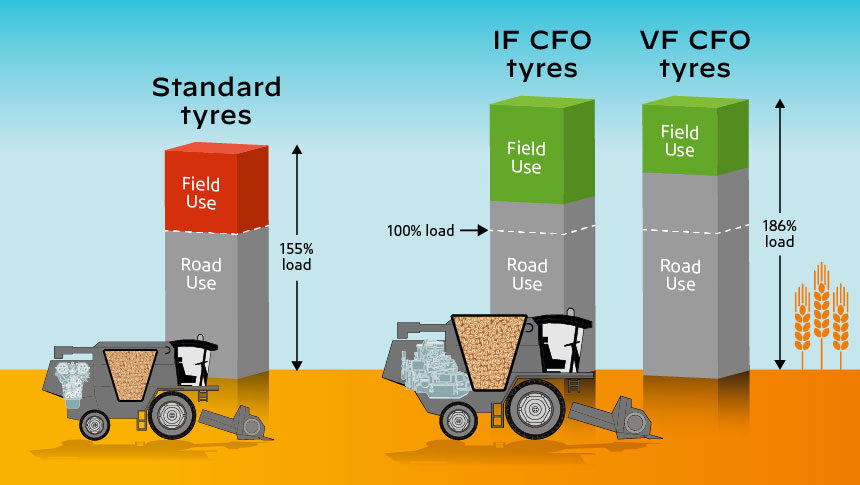
With VT-COMBINE IF and VF CFO tyres you can obtain an 86% bonus load:
- Do not drive at more than 15 Km/h during harvesting
- Maintain inflation pressure at 2.4 bars
- The maximum slope is 20% (11 degrees)
- Do not drive more than 1.5 km with a full harvester.
2. Which tyres are most suitable for polyculture farming
Your tractor is used for the management of livestock farming, but also for working the land. It must therefore be equipped with polyvalent tyres which can withstand work in the farmyard with a front loader bucket, cope with frequent sharp turns and at the same time be supple enough to provide good traction in the fields with longer lugs to work at a low inflation pressure.
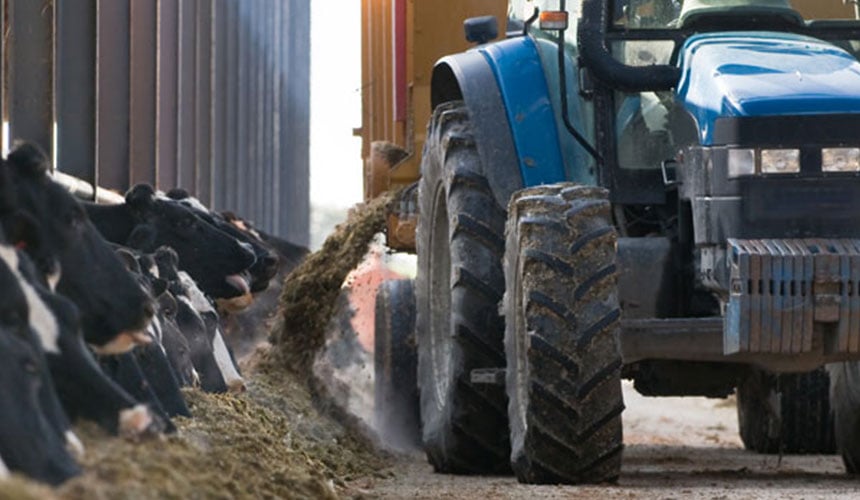
The VX-TRACTOR tyre, with its reinforced casing, is particularly adapted for this type of activity. Certain tyre sizes have 6 layers of rubber on the tread to provide stability in all circumstances and a high level of resistance during work on hard surfaces or transport by road.
These tyres have longer lugs than a normal tyre to provide better traction in the fields and more than 20% more rubber containing components that are resistant to wear, thus ensuring exceptional durability.
3. Which tyres to choose for vineyards or orchard farming
Vines and orchard trees are highly specific because their root systems need to be able to develop over several years and soil compaction must be avoided as this would be damaging to good development. In addition, the vehicles systematically follow the same path between the rows, leading to highly localised and excessive compaction.
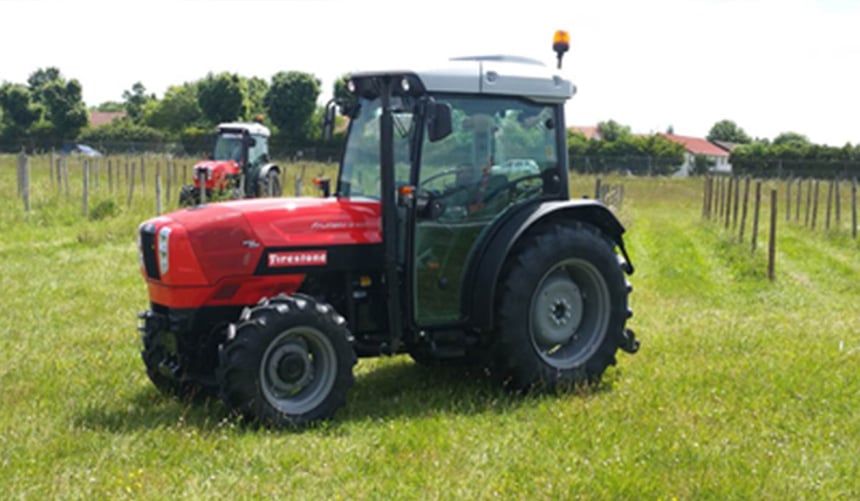
The use of low-pressure vineyard tyres is a good solution because their considerable deflection capacity allows them to work at low pressure, while spreading the load over a larger soil footprint.
4. Which tyres to use for spreaders or sprayers
It is impossible to drive between crop rows with wide tyres without damaging young seedlings. In addition, your trailer must be equipped with supple tyres to optimise the stability of the spraying boom which is severely tested by the swaying movement of liquid in the tanks, which is where choosing the right tyres can help you do a better job.
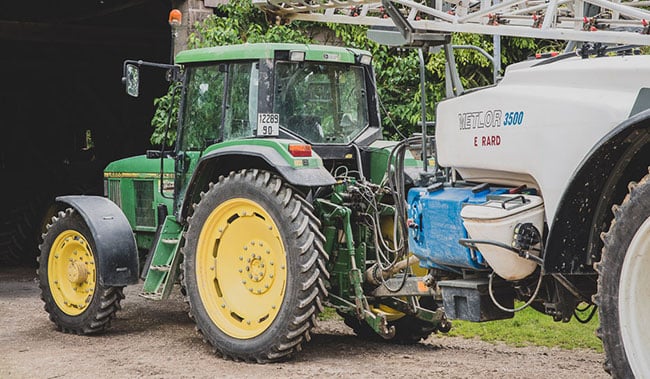 Choosing the latest technology narrow tyres will give you supple sidewalls that absorb shocks and limit the swaying effect. This category of tyre must have a steel belt to reinforce its narrow tread and provide sufficient resistance to ensure its durability.
Choosing the latest technology narrow tyres will give you supple sidewalls that absorb shocks and limit the swaying effect. This category of tyre must have a steel belt to reinforce its narrow tread and provide sufficient resistance to ensure its durability.
5. Which tyre corresponds to work on hard surfaces or forestry work
Using your very supple VF tyres which are intended for use in field crop farming to carry out forest clearing work or occasionally to work on a construction site would be a serious error, because these tyres are designed to avoid soil compaction and they will not withstand roots, branches or sharp stones for very long.
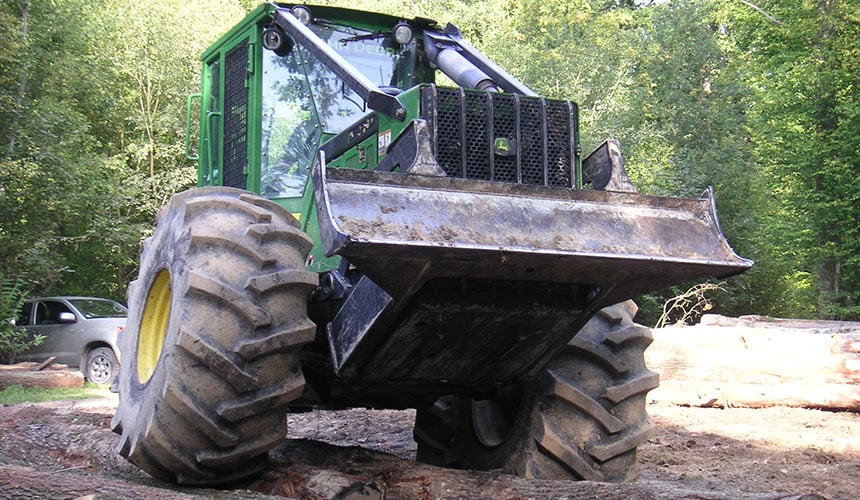
The best option is to use tyres that are intended for forestry work. These tyres are extremely different in terms of their design, with a diagonal structure that provides greater resistance in the sidewalls than radial tyres.
They are reinforced by one or more steel belts which are added to the casing and its different nylon plies. The layer of rubber in the sidewalls is increased by 20% to prevent tears and perforation and these tyres are used at a high inflation pressure with no consequences to the ground in the forest or to the concrete of a construction site.
Your tractor’s possibilities are multifold, but you must fit it with the right tyres to adapt it simply to every situation.
The Bridgestone-agriculture.eu blog is written and administered by tractor tyre experts who are available to provide you with the advice you need on the subject of your agricultural tyres. They allow you to maximise your productivity with information on all subjects linked to tyres: Technical data for agricultural tyres – Agricultural tyre performance – Air pressure advice, Solutions to avoid soil compaction – Sprayer tyre pressure – Why and how to ballast your tractor tyres – etc.
To take it one step further and increase the profitability of your farm, les Experts du pneu provide a free, highly detailed eBook which explains the essential role of the agricultural tyre in your productivity.
Most people who read this article have also read some of the following articles which are listed by order of popularity:
- Buying guide: 10 important tips for choosing the right farming tyres
- How to make the right choice for your agricultural or tractor tyres?
- Increase the yield of your sprayer with narrow VF tyres
- Do you know which are the best agricultural tyres for your sprayer?
- A good agricultural tyre is the best guarantee of sprayer stability
- What is the best tyre for my combine harvester, IF, VF or CFO?
- A hi-tech agricultural tyre to save time during your harvest
- The top 5 reasons for choosing VF agricultural tyres
- The VF agricultural tyre: VF technology increases your productivity
- Cheap agricultural tyres, discount agricultural tyres, is it worth it?
This information is intended only to make you aware of the technical and functional aspects of agricultural tires and their use. It does not allow you to make a judgment or a definitive conclusion on a given problem. Only your agricultural tire expert is able to make a technical assessment and take a final decision, case by case.
Leave a
commentary
Your email address will not be published.
Required fields are indicated with *


